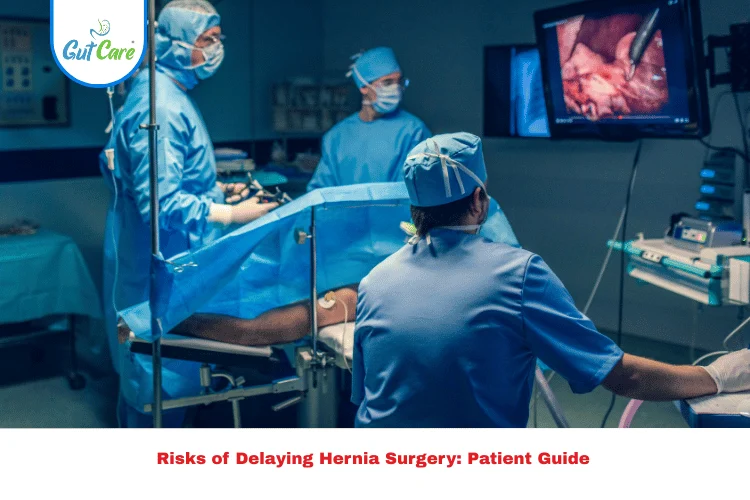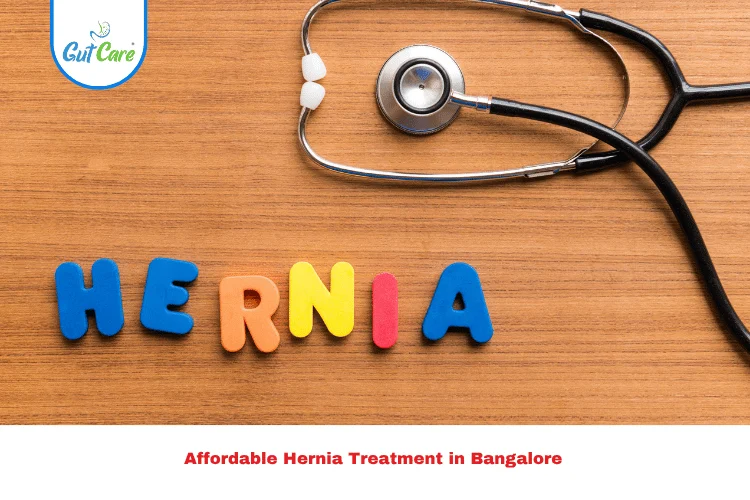If you’ve experienced swelling or pain in your groin or scrotal region, you’re probably wondering if you’ve got a hernia and hydrocele at the same time. At Gutcare Clinics, Bangalore, many patients have asked similar questions. There are many similarities in location, but hernia and hydrocele are caused by different processes and treated differently. We hope the information below will help you understand the key differences, symptoms, causes, and treatment options for hernia and hydrocele—and what happens when both occur simultaneously in the groin area.
It is important to understand these conditions both to treat your symptoms and, more importantly, to avoid complications. Often a lot can change with early diagnosis and treatment by appropriate and trusted professionals.
Understanding Hernia
A hernia is a medical condition where an internal organ or fatty tissue pushes through a weak spot in the muscle or connective tissue wall, most commonly in the abdomen or groin. The most frequent type related to this discussion is an inguinal hernia, which appears in the groin area.
What Happens in an Inguinal Hernia?
The abdominal wall has natural weak spots, especially where blood vessels and nerves pass through. When there is increased pressure inside the abdomen—due to lifting heavy objects, persistent coughing, or even chronic constipation—part of the intestine or fatty tissue can protrude through these weak areas, causing a bulge.
Symptoms of Hernia
- Noticeable bulge or swelling in the groin or scrotal area
- Discomfort or pain, especially when bending, coughing, or lifting
- A feeling of heaviness or pressure in the groin
- In severe cases, symptoms like nausea or vomiting if the hernia becomes strangulated (blood supply cut off)
A strangulated hernia is a medical emergency and requires immediate surgery.
What is Hydrocele?
A hydrocele occurs when fluid collects around a testicle in the thin sac that surrounds it, resulting in a swollen scrotum. Hydroceles are usually painless and don’t pose any dangers, however you may feel discomfort or a sensation of heaviness if the fluid is significant enough.
Causes of Hydrocele
- The most common methods of developing a hydrocele include:
- Congenital defects in newborns who have proper descent of their testicles and the process hasn’t properly closed
- Trauma or inflammation in adults, affecting the sac for a variety of reasons, sometimes infections or injuries
- In some cases the cause is unknown.
Symptoms of Hydrocele
The symptoms of hydroceles are:
- Painless swelling in the scrotum on one or both sides
- The sensation of heaviness in the scrotum
- Usually no redness or warmth, unless it is infected
- Unlike hernias, hydroceles rarely have pain or discomfort unless it is large.
Can Hernia and Hydrocele Occur Together?
It is indeed possible for hernia and hydrocele to happen at the same time. They both exist in the groin and scrotal area, with overlapping symptoms, which may hinder any self-diagnosis. For example, both hydrocele and hernia could have swelling and bulging, but the causes and treatment of each differ.
Because the groin and scrotum are adjacent anatomical regions, a patient could have a hydrocele and concurrently develop inguinal hernia or the other way around. Both conditions can coexist which complicates the clinical picture, highlighting the need for professional evaluation.
How Are Hernia and Hydrocele Diagnosed?
To diagnose the condition accurately, a comprehensive physical examination will be conducted by the doctor along with an ultrasound diagnostics test when relevant. Dr. Yuvrajsingh Gehlot has clinic facilities in Gutcare Clinics Bangalore and their area of expertise is in diagnosing and treating hernia and other similar issues using advanced protocols to differentiate between hernia and hydrocele, or both.
Physical Examination
- In the physical examination the doctor will examine the bulge/ swelling in the groins and observe its changes when performing strenuous activity such as coughing, and standing.
- In the case of the hydrocele, the swelling can usually be transilluminated ( light passes) and the hernia cannot.
Ultrasound Imaging
Ultrasound is an uncomplicated, non-invasive imaging test, that can assist the evidence of an accumulation of fluid (for hydrocele) or protruding tissue (for hernia); and also eliminate other conditions e.g. testicular cancers or infections.
Treatment Options for Hernia and Hydrocele
Hernia Treatment
Surgery is the definitive treatment for hernia, especially if it causes pain, grows larger, or risks complications such as strangulation. There are two main surgical options:
- Open Hernia Repair: A small incision is made in the groin, and the protruding tissue is pushed back, with the muscle wall reinforced using sutures or mesh.
- Laparoscopic Hernia Repair: A minimally invasive surgery using small incisions and a camera, offering quicker recovery and less pain.
Dr. Yuvrajsingh Gehlot at Gutcare Clinics is experienced in performing both open and laparoscopic hernia repairs with excellent outcomes.
Hydrocele Treatment
Hydroceles often don’t require immediate surgery unless they are large, painful, or cause discomfort. When treatment is needed:
- Aspiration: Fluid can be drained using a needle, but this is usually temporary.
- Hydrocelectomy: Surgical removal of the hydrocele sac, a permanent solution performed under local or general anesthesia.
Why Early Consultation is Crucial
Ignoring symptoms of hernia and hydrocele can lead to serious complications. Hernias can become strangulated, cutting off blood supply to the intestines, which is life-threatening. Large hydroceles, although less dangerous, may lead to discomfort and affect daily activities.
Early diagnosis and treatment at Gutcare Clinics in Bangalore, under the expert care of Dr. Yuvrajsingh Gehlot, ensure safe and effective management of these conditions. The clinic offers personalized care, modern surgical techniques, and a patient-friendly environment.
Summary
Although different, hernia and hydrocele may occur at the same time in some cases. Hernia and hydrocele have both the site of occurrence as groin and scrotum but have different causes and symptoms as well as treatments. Correct and prompt diagnosis by a specialist is the linchpin to effectively diagnose and manage these conditions. Hernias by most accounts typically require surgical repair of the hernia if it becomes symptomatic while hydroceles can oftentimes be managed conservatively and only warrant surgery if they become symptomatic.
If you are noticing any swelling, discomfort, or even abnormality in your groin or scrotum area, please visit and consult in clinic with Dr. Yuvrajsingh Gehlot at Gutcare Clinics Bangalore for the correct assessment and results driven treatment. Early assessment and intervention will help prevent long term complications and may equally improve quality of life.
FAQs
1. Can hernia and hydrocele happen together?
You can have both hernia and hydrocele at the same time as they involve neighbouring regions. It is important to be evaluated by someone who can assess both of them and determine treatment.
2. How does Dr. Yuvrajsingh Gehlot at Gutcare Clinics diagnose hernia and hydrocele?
Dr. Gehlot directly examines the area but also recommends ultrasound to make a thorough diagnosis for hernia and hydrocele so that suitable treatment makes sense for the patient.
3. What is the treatment for hernia and hydrocele?
Hernias are usually treated with surgery to repair the muscle wall, and hydroceles can be drained or surgically excised if they are symptomatic.
4. Are all hernias surgically treated?
Some hernias may not require surgical treatment right away, but most will and surgery is always completed to prevent future complications. A specialist can assist with choosing the timing of surgery and the type of surgery based on the patient condition.
5. Are hydroceles painful or dangerous?
Hydroceles are generally painless, but can lead to discomfort if they are of significant size. Infection and/or complications are rare but if you have swelling increases or if you develop pain, you must seek medical attention.




